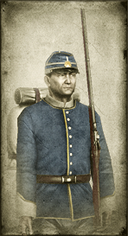
Basic Unit Statistics (can be modified by difficulty level, arts, skills, traits and retainers)
| Recruitment Cost | 1200 | |
| Upkeep Cost | 160 | |
| Melee Attack | 6 | 17% |
| Charge Bonus | 15 | 30% |
| Bonus vs Cavalry | 5 | 16% |
| Range | 125 | 19% |
| Accuracy | 45 | 45% |
| Reloading Skill | 55 | 55% |
| Ammunition | 15 | 18% |
| Melee Defence | 4 | 11% |
| Armour | 2 | 13% |
| Morale | 8 | 16% |
Strengths & Weaknesses
- Good accuracy and reload rate.
- Average in melee.
- Weak against cavalry.
- Good morale.
Abilities
- Kneel Fire - The first rank of this unit will kneel to allow the first two ranks to fire simultaneously.
- Suppression Fire - This ability increases reload rate but lowers accuracy. Enemy units hit by suppression fire are slowed and suffer a morale penalty.
Requires
Description
Imperial infantry are trained to stand in line and fire on approaching enemies.
They carry European arms and equipment, and have been trained by European military advisors, although they are usually commanded by Japanese officers when in action. They are well-versed in modern weaponry, and can deliver accurate, sustained, and damaging fire with their rifles. They are capable of reloading quickly, and have good morale as a result of their training. Imperial infantry are reasonably useful in close combat but, like all infantry, are vulnerable to being overrun by cavalry if left in a poor tactical position. The Enfield Pattern 1853 rifle-musket was a typical weapon of its period issued to line infantry. Firing a bullet wider than a man's thumb, it was made in large numbers for the British Army, allies, and almost any foreign customers who had the money. It was used in great numbers by both sides in the American Civil War and, after artillery, probably caused more casualties than any other weapon in that conflict. It's most destructive and disruptive moment, however, had nothing to do with a battlefield. The Enfield was issued by the British East India Company to its troops, including Indian Sepoys. A combination of British pig-headedness in not taking native sensibilities into account and native rumour-mongering made the Enfield the immediate cause of the Indian Mutiny of 1857. The cartridges for the rifle were waxed, to keep out the damp, but rumour had it that they were greased with pig and beef fat, violating the religious strictures of Muslim and Hindu alike. The result was trouble, rebellion and massacre.
